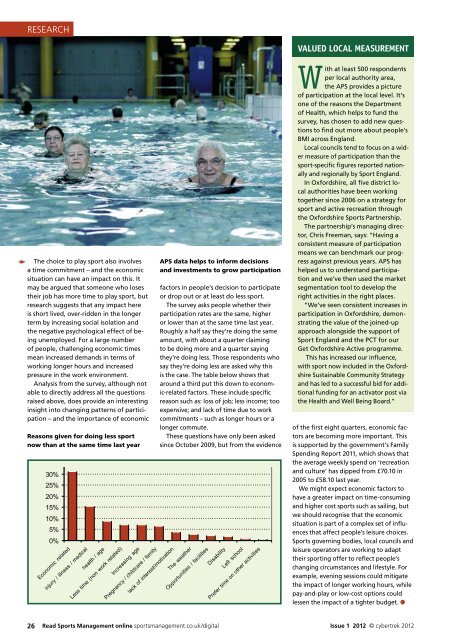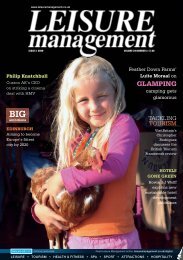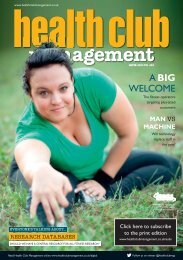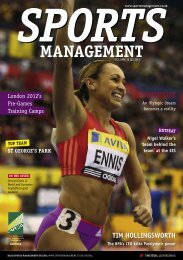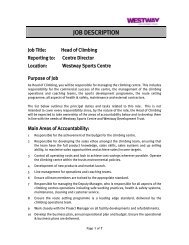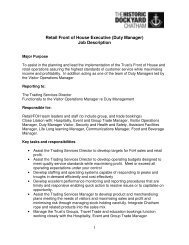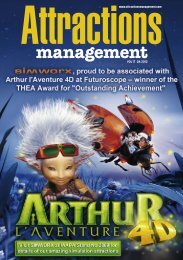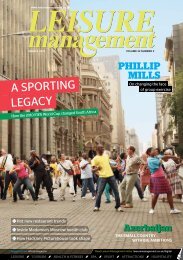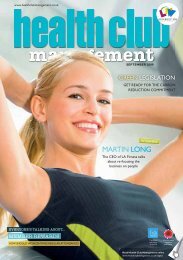Sports Management Issue 1 2012 - Leisure Opportunities
Sports Management Issue 1 2012 - Leisure Opportunities
Sports Management Issue 1 2012 - Leisure Opportunities
Create successful ePaper yourself
Turn your PDF publications into a flip-book with our unique Google optimized e-Paper software.
RESEARCH<br />
The choice to play sport also involves<br />
a time commitment – and the economic<br />
situation can have an impact on this. It<br />
may be argued that someone who loses<br />
their job has more time to play sport, but<br />
research suggests that any impact here<br />
is short lived, over-ridden in the longer<br />
term by increasing social isolation and<br />
the negative psychological effect of being<br />
unemployed. For a large number<br />
of people, challenging economic times<br />
mean increased demands in terms of<br />
working longer hours and increased<br />
pressure in the work environment.<br />
Analysis from the survey, although not<br />
able to directly address all the questions<br />
raised above, does provide an interesting<br />
insight into changing patterns of participation<br />
– and the importance of economic<br />
Reasons given for doing less sport<br />
now than at the same time last year<br />
30%<br />
25%<br />
20%<br />
15%<br />
10%<br />
5%<br />
0%<br />
APS data helps to inform decisions<br />
and investments to grow participation<br />
factors in people’s decision to participate<br />
or drop out or at least do less sport.<br />
The survey asks people whether their<br />
participation rates are the same, higher<br />
or lower than at the same time last year.<br />
Roughly a half say they’re doing the same<br />
amount, with about a quarter claiming<br />
to be doing more and a quarter saying<br />
they’re doing less. Those respondents who<br />
say they’re doing less are asked why this<br />
is the case. The table below shows that<br />
around a third put this down to economic-related<br />
factors. These include specific<br />
reason such as: loss of job; less income; too<br />
expensive; and lack of time due to work<br />
commitments – such as longer hours or a<br />
longer commute.<br />
These questions have only been asked<br />
since October 2009, but from the evidence<br />
Economic related<br />
injury / illness / medical<br />
health / age<br />
Less time (non work related)<br />
Increasing age<br />
Pregnancy / childcare / family<br />
lack of interest/motivation<br />
The weather<br />
<strong>Opportunities</strong> / facilities<br />
Disability<br />
Left school<br />
Prefer time on other activities<br />
VALUED LOCAL MEASUREMENT<br />
W<br />
ith at least 500 respondents<br />
per local authority area,<br />
the APS provides a picture<br />
of participation at the local level. It’s<br />
one of the reasons the Department<br />
of Health, which helps to fund the<br />
survey, has chosen to add new questions<br />
to find out more about people’s<br />
BMI across England.<br />
Local councils tend to focus on a wider<br />
measure of participation than the<br />
sport-specific figures reported nationally<br />
and regionally by Sport England.<br />
In Oxfordshire, all five district local<br />
authorities have been working<br />
together since 2006 on a strategy for<br />
sport and active recreation through<br />
the Oxfordshire <strong>Sports</strong> Partnership.<br />
The partnership’s managing director,<br />
Chris Freeman, says: “Having a<br />
consistent measure of participation<br />
means we can benchmark our progress<br />
against previous years. APS has<br />
helped us to understand participation<br />
and we’ve then used the market<br />
segmentation tool to develop the<br />
right activities in the right places.<br />
“We’ve seen consistent increases in<br />
participation in Oxfordshire, demonstrating<br />
the value of the joined-up<br />
approach alongside the support of<br />
Sport England and the PCT for our<br />
Get Oxfordshire Active programme.<br />
This has increased our influence,<br />
with sport now included in the Oxfordshire<br />
Sustainable Community Strategy<br />
and has led to a successful bid for additional<br />
funding for an activator post via<br />
the Health and Well Being Board.”<br />
of the first eight quarters, economic factors<br />
are becoming more important. This<br />
is supported by the government’s Family<br />
Spending Report 2011, which shows that<br />
the average weekly spend on ‘recreation<br />
and culture’ has dipped from £70.10 in<br />
2005 to £58.10 last year.<br />
We might expect economic factors to<br />
have a greater impact on time-consuming<br />
and higher cost sports such as sailing, but<br />
we should recognise that the economic<br />
situation is part of a complex set of influences<br />
that affect people’s leisure choices.<br />
<strong>Sports</strong> governing bodies, local councils and<br />
leisure operators are working to adapt<br />
their sporting offer to reflect people’s<br />
changing circumstances and lifestyle. For<br />
example, evening sessions could mitigate<br />
the impact of longer working hours, while<br />
pay-and-play or low-cost options could<br />
lessen the impact of a tighter budget. <br />
26 Read <strong>Sports</strong> <strong>Management</strong> online sportsmanagement.co.uk/digital<br />
<strong>Issue</strong> 1 <strong>2012</strong> © cybertrek <strong>2012</strong>


